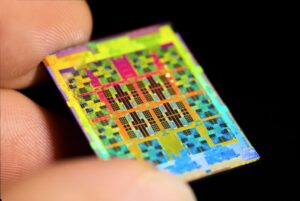
Baikal is probably a name that is foreign to some of you but the Russia-based company, which is a spin-off of the Russian supercomputer company, T-Platforms, has its 15 minutes of fame on the internet last week. After evidence of its own 48-Core CPU had emerged.
The existence of Baikal’s 48-core server-grade SoC, officially known as the BE-S1000, was confirmed by Twitter user Fritzchens Fritz (@FritzchensFritz), who claims to have obtained a sample, and even managed to throw it under an infrared microscope. Giving us a more detailed look at its internals.
BE-S1000 from Baikal Electronics, 48 Core Arm Cortex-A75 CPU for HPC
CPU manufactured at TSMC with 16nm. For the next few years, probably one of the last Russian CPUs with modern process node. pic.twitter.com/KDhSoXXxem
— Fritzchens Fritz (@FritzchensFritz) October 13, 2022
According to Fritz, the Baikal BE-S1000 is based on an older 16nm die lithography from TSMC, contains 48 ARM Cortex-A75 cores that run at 2GHz across 12 clusters, and has a 32MB L4 Cache, running across four blocks. Other details about it include 72-bit memory interfaces that supports up to 768GB DDR4-3200 ECC memory, which is 128GB per channel; five PCIe 4.0 x16 interfaces, one USB 2.0 controller, two 1GbE interfaces, and an allotment of general purpose I/Os.
In terms of performance, Baikal said that the BE-S1000 would be able to dance with AMD’s 16-core EPYC 7351 server CPU that runs at 2.9GHz, Intel’s 20-core Xeon Gold 6148, which runs at 2.4GHz, and Huawei’s own 48-core Kunpeng 920 that runs at 2.6GHz. To be fair, that’s not exactly a comforting sign, given that two of those server-grade processors – the ones from Team Red and Team Blue – launched way back in 2017.



Baikal was supposed to launch its BE-S1000 server SoC sometime between this year and 2023 and it would have given the other brands a run for their money, at least to some measurable degree. However, because of Russia’s ongoing and unprovoked war in Ukraine, that plan has certainly gone out the window. So, it looks like the server-grade processor will never become an actual product, let alone see distribution to the rest of the world.
(Source: Tom’s Hardware, Twitter)
The post Russian Baikal Reportedly Made 48-Core CPUs For Servers appeared first on Lowyat.NET.
